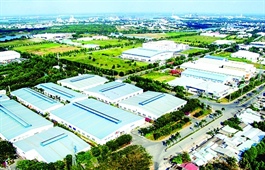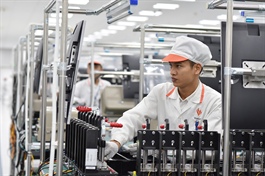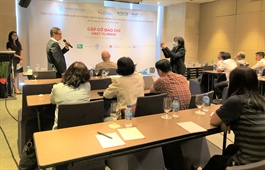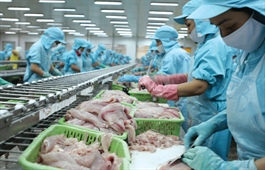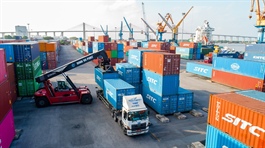Ministries will support businesses to take RCEP opportunities
Ministries will support businesses to take RCEP opportunities
The Ministry of Industry and Trade (MoIT) and the Ministry of Agriculture and Rural Development will step up support for the Vietnamese business community to effectively exploit opportunities from the Regional Comprehensive Economic Partnership (RCEP), contributing to export promotion and economic development.

This is a free trade agreement signed by 10 ASEAN member countries and five partner countries – Japan, South Korea, China, Australia and New Zealand – on November 15, 2020. RCEP came into effect on January 1, 2022.
Many RCEP member countries are the owners and suppliers of major strategic raw materials in the world, such as China, South Korea and ASEAN countries.
They are also the leading important trading partners of Viet Nam like China, South Korea, and Japan, with the total trade turnover accounting for more than half of the national trade revenue.
RCEP will form the world's largest free trade area with 2.2 billion consumers, accounting for about a third of the world's population and global GDP.
Strong commitments to opening the market for goods, services and investment and a common rule on origin for the 15 RCEP countries will be favourable conditions for forming and developing new supply chains in the region with the participation of the Vietnamese business community.
"These will be an important foundation to create favourable conditions for Vietnamese industries and businesses in diversifying input materials to improve productivity, quality and competitiveness. They will help promote exports and the country's socio-economic development," said Minister of Industry and Trade Nguyen Hong Dien.
However, there are also many difficulties and challenges because the regional economies are competitive, even in fields where Viet Nam has strengths.
Therefore, domestic enterprises must actively adapt and turn challenges into opportunities to improve competitiveness in domestic and foreign markets.
Dang Phuc Nguyen, general secretary of the Viet Nam Fruit and Vegetable Association, said vegetables and fruits exported or imported among RCEP members must be under quotas or the signed protocol.
For example, Viet Nam is only allowed to officially export 10 fruit and vegetable products to China, including dragon fruit, mango, jackfruit, rambutan, lychee, mangosteen, and watermelon, banana, longan and black jelly.
Other Vietnamese fruit and vegetable products are undergoing long negotiations for export approval to China, including durian, passion fruit, sweet potato, lemon, grapefruit and avocado.
According to Nguyen, from January 2022 to now, China has implemented "Zero COVID," including a strict inspection policy for food, agricultural products and vegetables exported from all countries to China, including Viet Nam.
This has made Vietnamese fruits and vegetables stagnant at the border gates, causing much damage to enterprises and farmers of Viet Nam.
Tran Thi Lan Anh, general secretary of the Viet Nam Chamber of Commerce and Industry (VCCI), said that despite being affected by COVID-19, Viet Nam saw impressive growth in exports partly due to the new generation FTAs, especially RCEP.
According to Lan Anh, the agreement significantly impacts Vietnamese businesses because RCEP partners are the suppliers of about 70 per cent of Viet Nam's imports and the market for nearly 40 per cent of Viet Nam's exports. This is also the region with many global value chains and the largest sources of FDI in the economy.
The agreement is expected to open up integration opportunities for businesses. On the other hand, with many partners whose economic structure competes directly with Viet Nam, RCEP also poses significant competitive challenges.
Among the FTAs Viet Nam has signed, RCEP forces Vietnamese businesses to face many of the strongest competitors simultaneously.
Many economies in RCEP have a similar structure to Viet Nam, while their experience, capital and competitiveness are better. The challenge of this agreement for Vietnamese enterprises is not only in the domestic market but also in export markets.
In the domestic market, with the commitments to open up in RCEP, similar goods from RCEP members, especially from China and ASEAN, will enjoy more tax incentives when imported into the Vietnamese market. This competitive pressure is forecast to be more intense in the future.
To overcome these difficulties, Lan Anh recommends businesses actively explore the agreement's commitments to make the most of opportunities from RCEP or deal with challenges.
In addition, enterprises must improve their competitiveness to survive and develop in the context of increasing economic integration.
Dien said there were many unprecedented global challenges in the past two years due to the pandemic.
However, Viet Nam has gradually overcome the difficulties and achieved positive results in various fields partly due to taking advantage of opportunities and advantages from the FTAs that Viet Nam has signed to diversify the export market and products. So far, Viet Nam has signed 17 FTAs with most of the world's major economies, including RCEP.
In 2021, Viet Nam, for the first time, gained an annual growth of 23 per cent in trade value to US$670 billion, bringing Viet Nam to the 20 leading economies in terms of international trade.
The export value had high growth of 19 per cent. Viet Nam also gained a trade surplus of $4 billion for the sixth straight year.








